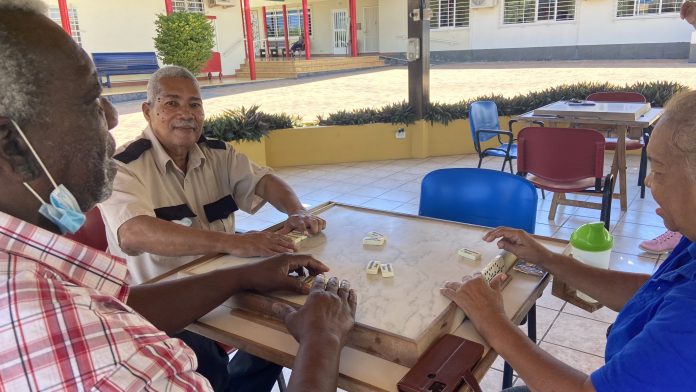Club Kibrahacha 60+ is a centre that offers various activities and services to the dynamic 60+ group, so that they can work together on a long and healthy life. During a visit by our reporter, the club explained that despite having confronted a lot of challenges after the pandemic, they still managed to continue providing their services and continue with the activities they arrange for their clients.
Jeffrey Matos, director of Club Kibrahacha, explained that since last year they are active again. They were active during the Covid period, but now in 2022 they started being more open and flexible with rules. “This brought growth back in the quality of the membership who come here, you can notice that a lot more people began coming this year”, Mr. Matos commented. This in turn makes the enthusiasm of our older persons also go up, after a time that was very confusing and a little bit scary during the pandemic.
Now they started back with their events, meetings and parties, naturally taking into account everything regarding the safety of each person. “It’s going well. We’ve done various health workshops, cuarta lessons, we expanded during the year. Recently we just closed an agreement with Club Roy 50+, where our clients can go there to do their physical activities on their gym machines”, Mr. Matos explained. This is the kind of cooperation that the organization of Club Kibrahacha 60+ believes in, and that they want to keep promoting also because it is very important.
This foundation has 37 years of existence, and if one looks at the last census 2020, according to Mr. Matos, it shows indication of around 23,000 persons 60+ currently on Aruba. It is a large percentage in our society. “There you realized that the role of our foundation is becoming more and more important in our community, and the concept of what we’re doing – like providing transport to bring people from different neighborhoods and try to bring them out of loneliness. It is a stable organization, and you can see that there is a need for what we’re offering.”
Now that there is more flexibility to do activities, it can be noted that people are more enthusiastic, and they even got several new members. Recently before the summer they organized a cuarta concert that went really well, at the club itself, with great enthusiasm and which brought a lot of cheer. It’s worth noting that a lot of men love practicing music, where before there was a limitation for men to partake in social activities for one reason or another, mostly they play domino but very few you find at other events, according to Mr. Matos. So this is a very positive sign, to start seeing more participation through e various types of different activities that they are now executing.
When our reporter entered the property to do the interview, right away they noticed that a lot of attention is being paid to the place, the ambience is calm and tranquil. During an interview with Kelsey Arends, policy officer at Club Kibrahacha, there was a group of clients playing domino who looked really happy. Kelsey is a young person doing a lot of good work recently at Club Kibrahacha, learning a lot, and adding her own knowledge in order to better the service provided to the customers. A young person with a lot of potential.
Currently there are around 200 active members. The pandemic did affect the financial situation of the foundation quite heavily, according to Mr. Matos. They have four streams of income, which are a government subsidy – around 40 percent of subsidy for all their costs – as well as a member’s contribution. Rotary also provides help, and finally, fundraising. All these incomes were affected during the pandemic, and they had to try to spend less, adapt, and carry one. It will take around three years to reach the pre-pandemic level once again, according to Mr. Matos, but a lot of things had to be postponed, like maintenance, and some cuts also had to be made. But despite it all, they managed to keep afloat.
Matos concludes: “You cannot adapt the contribution by increasing the price, somewhere you need to create the income. Meaning what we did – is not the way going forward, however – but we reduced spending. This are just challenges that you find, like any organization, and I think we dealt with it in a positive way. We are not going to knock on the government’s door, or say we are stopping operations. I think we have a very humble team here. It’s more about the passion with which you work, for whom you are working. This was our focus, we did not focus on if there was money or not, we just carried on working. We went through it, and I think as a foundation, we can carry on.”

















